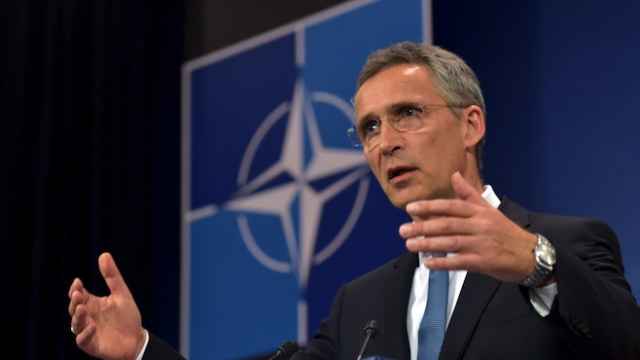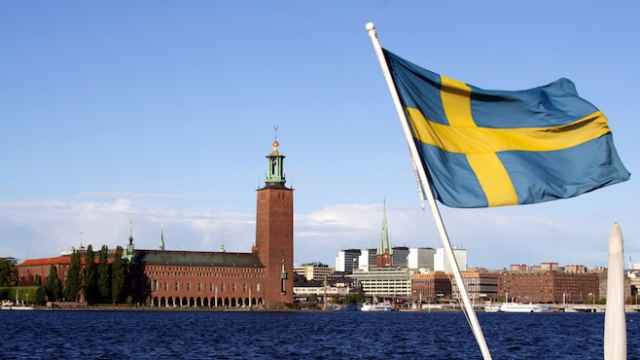Ukraine pressed NATO on Tuesday for Western weaponry to help defend itself against pro-Russian separatists but the head of the alliance resisted for fear of threatening a fragile ceasefire with Russian-backed rebels.
In Kiev's imposing Soviet-era government buildings, Ukraine's political leadership told NATO Secretary-General Jens Stoltenberg that their armed forces were no match for Russia, and needed help.
"Our heroes, our warriors belong to an army that was neglected for decades … they face aggression and need defensive weaponry," the speaker of the parliament, Volodymyr Groysman, told Stoltenberg making his first visit to Ukraine as head of NATO, 18 months after Russia seized Ukraine's Crimean peninsula.
Prime Minister Arseny Yatseniuk, sitting alongside Stoltenberg at a national security council meeting, was equally blunt in depicting a threat from Russia which, however, denies it has provided weapons to the rebels in the east.
"Defense capabilities are essential to us in the face of a nuclear country, which has spent tens of billions of dollars on modernizing its army," Yatseniuk said.
Diplomats said the issue of weaponry was raised at the security council, but the tone was less strident than in public. Initially, defensive equipment, for the Ukrainians, could include more communication equipment, they said.
Hours earlier, Stoltenberg had signed agreements to help modernize the Ukrainian armed forces.
But Stoltenberg said that was as far as NATO would go, saying that "NATO does not provide or supply weapons."
"The main focus now is the implementation of the Minsk agreement," Stoltenberg said, adding that Monday was the first day since the peace deal was signed in February in which no violations of the ceasefire had been registered.
Europe's Outpost
The ebb in violence in Ukraine's east, where the West say Russia is supporting and arming separatists and has positioned its own heavy weapons, was an opportunity for new momentum for diplomacy, Stoltenberg said.
Ukrainian President Petro Poroshenko, while accepting that non-NATO Ukraine could not expect direct military aid, portrayed his country as a bulwark against Russian aggression that could one day threaten other parts of the continent.
"De jure we are not allies, but de facto we are much more than partners. Ukraine is the most eastern outpost of the Euro-Atlantic area," Poroshenko said.
Stoltenberg sees Ukraine as the most complex of Europe's many crises and backs the 11-step Minsk peace deal signed in February that set an end-year deadline for implementation.
He sees the alliance's role mainly limited to helping rebuild the Ukrainian army after years of mismanagement that was reflected in defeats by the pro-Russian rebels.
Former president Viktor Yanukovich dropped a bid to join NATO in 2010 to please Moscow. When he moved last year to decline an EU partnership deal and draw closer to Moscow, he was toppled by protests dubbed by Russia a Western-backed coup.
The current pro-Western leadership under Poroshenko now sees NATO membership as the only way to protect its territory. NATO, however, wants to avoid provoking Moscow.
Russia opposes any potential expansion of NATO to former communist areas of eastern and southeastern Europe, part of a battle for influence that lies at the heart of the conflict in Ukraine.
A Message from The Moscow Times:
Dear readers,
We are facing unprecedented challenges. Russia's Prosecutor General's Office has designated The Moscow Times as an "undesirable" organization, criminalizing our work and putting our staff at risk of prosecution. This follows our earlier unjust labeling as a "foreign agent."
These actions are direct attempts to silence independent journalism in Russia. The authorities claim our work "discredits the decisions of the Russian leadership." We see things differently: we strive to provide accurate, unbiased reporting on Russia.
We, the journalists of The Moscow Times, refuse to be silenced. But to continue our work, we need your help.
Your support, no matter how small, makes a world of difference. If you can, please support us monthly starting from just $2. It's quick to set up, and every contribution makes a significant impact.
By supporting The Moscow Times, you're defending open, independent journalism in the face of repression. Thank you for standing with us.
Remind me later.





